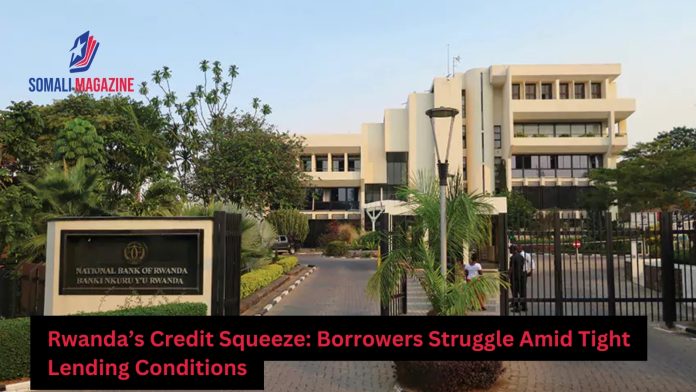Facebook Twitter (X) Instagram Somali Magazine - People's Magazine
Rwandan borrowers are facing mounting challenges as the country grapples with a prolonged credit crunch, driven by tightening monetary policies, rising interest rates, and limited access to affordable financing. The situation has placed significant strain on businesses and individuals alike, with many struggling to secure loans for expansion, investment, or personal needs.
The National Bank of Rwanda (BNR) has maintained a cautious approach to lending, citing concerns over inflation and financial stability. While Rwanda’s economy has demonstrated resilience, the central bank’s restrictive policies have led to reduced liquidity in the financial sector, making it harder for borrowers to access credit. Analysts warn that unless corrective measures are taken, the credit squeeze could stifle economic growth and hinder entrepreneurship.
One of the primary factors contributing to the credit crunch is the high cost of borrowing. Interest rates on loans remain elevated, discouraging businesses from taking on debt for expansion. Small and medium-sized enterprises (SMEs), which form the backbone of Rwanda’s economy, have been particularly affected, with many unable to secure financing due to stringent lending criteria. The lack of accessible credit has forced some businesses to scale down operations or delay investment plans, impacting job creation and economic activity.
Additionally, Rwanda’s banking sector has been cautious in extending loans due to concerns over non-performing loans (NPLs). Financial institutions have tightened lending requirements, demanding higher collateral and stricter repayment terms. This has further limited access to credit, particularly for first-time borrowers and those without substantial assets. The situation has created a cycle where businesses struggle to grow due to limited financing, while banks remain hesitant to lend due to perceived risks.

Government domestic borrowing has also played a role in the credit crunch. As the government seeks funding for infrastructure projects and development initiatives, it competes with the private sector for available credit. This has led to reduced loan availability for businesses and individuals, exacerbating the financial strain. While Rwanda’s debt levels remain manageable, the increasing reliance on domestic borrowing has raised concerns about long-term sustainability.
Despite these challenges, Rwanda’s financial authorities have expressed confidence in the country’s economic trajectory. The government has implemented policies aimed at improving financial inclusion, including initiatives to expand access to credit for underserved populations. However, critics argue that more needs to be done to address structural barriers that prevent businesses and individuals from obtaining affordable loans.
The long-term credit crunch has also highlighted the need for greater financial literacy and awareness among borrowers. Many individuals lack the necessary knowledge to navigate the complexities of loan applications, leading to misunderstandings and missed opportunities. Financial institutions have been urged to enhance transparency and provide clearer guidance to borrowers, ensuring they can make informed decisions about their financial futures.
As Rwanda continues to position itself as a regional economic hub, addressing the credit crunch will be crucial for sustaining growth and fostering innovation. Policymakers and financial institutions must work together to create a more inclusive lending environment, ensuring that businesses and individuals have access to the resources they need to thrive. The coming months will be critical in determining whether Rwanda can overcome its credit challenges and unlock new opportunities for economic development.

